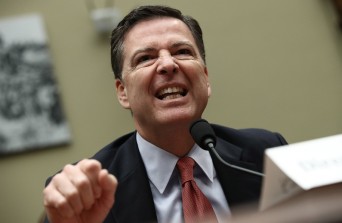It Can’t Happen Here
In pursuing what led to the Trump “victory” – yes, I’m putting that in quotes – we’re beginning to observe an ongoing conflict between two themes: Lesser of two evils vs Cognitive Dissonance. As for the first, it’s clear by now, with two astoundingly unpopular major candidates, that literally millions of people on both sides held their noses and chose the least unfavorable, the one whose promises overrode their perceived character. That’s a rational position, regardless of which side it comes from.
But the more irrational process of cognitive dissonance goes farther in explaining how we justify our opinions. George Lakoff, in one of the best articles on voting preferences that I’ve seen so far , writes:
If facts don’t fit the worldviews in our brains, the facts may not even be noticed, or they may be puzzling, ignored or rejected outright, or if threatening, attacked. All of these happen in politics…
This happened and is happening on all points of the spectrum. On the right, it takes the form of He doesn’t really mean those terrible things he says – or – He’s vulgar and ignorant of Scripture but deep down he’s really a Christian. It takes the form of Jews praising Steve Bannon. Since the election, the corporate media have fallen all over themselves “normalizing” this fascist.
On the left, despite the many insightful articles I’ve been referencing above, cognitive dissonance takes the form of refusal to accept the extraordinary corruption and criminality at the core of the Republican campaign. And 2016 was nothing new. As I write in Chapter Eight of my book:
A half-century before the “Neo-Cons,” reactionaries were willing to say absolutely anything to amplify fear. From this point on, we can follow the predatory imagination to its logical extreme – doing whatever is necessary. But the myth of Good Intentions is so pervasive that generations would pass before liberals, innocent believers in “fair play,” would begin to acknowledge that conservatives had never played by the rules.
By 1968, when Richard Nixon and Henry Kissinger struck a last-minute deal with the Vietnamese government to prolong the war, doing whatever is necessary became standard Republican election strategy. The term “October Surprise” came into use four years later and into common usage in 1980, when the Reagan campaign struck their own last-minute deal with the Iranian government. Mass acceptance of the phrase came after the 2000 election, which ushered in the era of disenfranchisement and electronic voter fraud.
Then we have the question of Russians hacking the DNC’s emails, an idea which circulated so widely for so long – at least until the day after the election – that most people assumed first of all that it was true and secondly that it meant something. The consensus that it was true did have one effect – it served to deflect media attention from the content of the emails that had been revealed, or at least to the extent that no one seems to have polled anyone about whether the information actually caused them to change their vote. My conclusion: as Tony Soprano said, forgedaboudit.
Still, when FBI Director Comey revealed the new investigation of Clinton, I was amazed at how many times I heard conventional media spokespersons casually speak of an October Surprise, as if they expected that their viewers wouldn’t be surprised at such shenanigans.  Despite my knowledge of long-term dirty tricks happening shortly before most presidential elections, I’ll admit to a bit of my own naiveté. I thought, “At this late date could it be possible that anyone in the country is still undecided, that anyone who will vote is still wondering: Hillary or Donald? This is non-news; it means nothing.” Apparently, I was wrong. Kevin Drum writes that
Despite my knowledge of long-term dirty tricks happening shortly before most presidential elections, I’ll admit to a bit of my own naiveté. I thought, “At this late date could it be possible that anyone in the country is still undecided, that anyone who will vote is still wondering: Hillary or Donald? This is non-news; it means nothing.” Apparently, I was wrong. Kevin Drum writes that
…the news of the investigation accelerated the shift of a largely hidden rural mass of voters toward Trump…People who decided on their vote during the last week—after Comey wrote his letter—broke strongly for Trump. People who decided on their vote during the last couple of days—after Comey cleared Clinton—broke about evenly.
When did you decide your vote?
Clinton Trump
Last Week (6%) 38% 50%
Last few days (8%) 44% 46%
Mike Davis agrees: “A crucial cohort of college-educated white Republican women appeared to have rallied to Trump in the last week of the campaign after having wavered in previous polling.”
On many levels we can perceive the election as expressing disputes between various groups within the “deep state.” While Clinton retained the loyalty of most of the national security apparatus, the domestic security community – the national police, if you prefer – was divided between the Justice Department, led by Obama appointees, and the FBI. There, sources told The Guardian that there was much antipathy toward her. “The FBI is Trumpland,” said one current agent.
So much goes on at these levels, under the table so to speak, that all we can do is speculate. But it seems likely that the notion of “Republicans vs Democrats” was the most superficial. And such speculation can only lead us toward guessing about why “they” wanted us to vote or not vote. However, everyone, informed or not, racist or not, made their own choices.
The first four sections of this essay have dealt with various approaches to the question of why people voted the way they did. Now we’ll have to move toward the question of whether they actually voted. And once we do, all we’ve said about Democratic incompetence (not the neoliberalism) will prove to be completely irrelevant.
We need to go deeper.